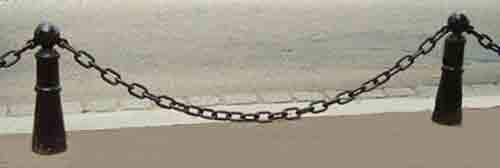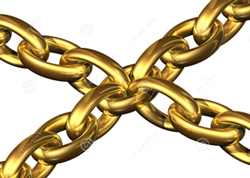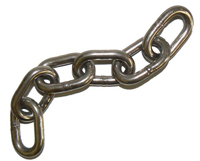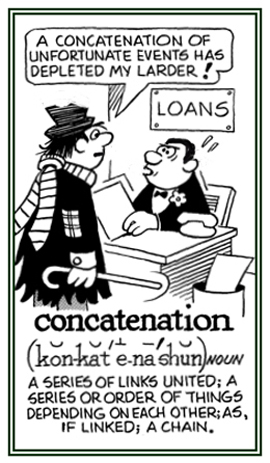caten-, catenat-
(Latin: a chain; bind or fasten together; connected links)
2. Etymology: from Latin, "chain".

Go to this Word A Day Revisited Index
so you can see more of Mickey Bach's cartoons.
A catenary object is also called a "chainette" that has the curve formed by the force of gravity in which a uniform flexible cable hangs when it is suspended from two points.
2. Etymology: from modern Latin catenaria; from Latin catena, "chain".

2. To make a chain of atoms of the same element that is held together by chemical bonds: Some chemical molecules consist of a number of carbon elements that catenate or bond together into a particular order or sequence.
3. Etymology: from Latin caternat-; from catenare, "to chain, to bind together".

2. Etymology: from Latin catenat-, "chained, fettered"; from the verb catenare, "to chain".


Several other substances are capable of forming an expansive range of catenations, including silicon, sulfur, and boron.
2. In medicine, indicating the arrangement of a number of bodily structures: Enlarged lymph glands are concatenated in a row like the links of a chain.
A chainlike series associated with nerve cells or physiological reflexes are also concatenated.
3. Etymology: from Latin concatenare, "to link together"; from con-, "together" + catenare, "to chain, to bind".An extraordinary concatenation of factors contributed to Norman's success as a computer programmer.
When the man said that the concatenation of unfortunate events had depleted his "larder", he was referring to a cool room or a cupboard for storing food and such larders were used by people before the common use of refrigerators.

Go to this Word A Day Revisited Index
so you can see more of Mickey Bach's cartoons.
The concatenator combines all the pages from the selected PDF to present and to exchange documents reliably, independent of software, hardware, or operating system for someone's computer.
PDF files provide electronic images of text, or text and graphics, that look like printed documents and can be viewed, printed, and electronically transmitted by concatenators.
2. Relating to a reversal of events, issues, or facts: The obvious unconcatenated contents of his speeches resulted in the politician losing the election because he didn't tell the truth.
